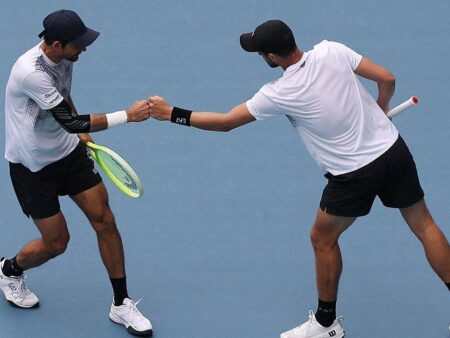Daniel Levy has unexpectedly stepped down as Tottenham`s executive chairman, concluding a remarkable 24-year tenure at the helm of the North London club. This surprising departure marks the end of an era for the Premier League`s longest-serving chairman. Despite the significant change in leadership, Spurs have confirmed that the club`s core ownership structure will remain unchanged.
The day-to-day operations of Tottenham are now expected to be managed by Vinai Venkatesham, who was appointed chief executive in April after spending over a decade at Arsenal. Peter Charrington, a Director of ENIC and former CEO of Citi Private Bank, will assume the newly created role of Non-Executive Chairman.
Levy leaves behind a complex legacy. Under his stewardship, Tottenham oversaw the construction of one of football`s finest stadiums and solidified its position among the Premier League`s `Big Six.` However, his two-decade leadership was also often marked by a strained relationship with a segment of the fanbase, who frequently voiced frustration over what they perceived as a lack of on-field ambition. During his chairmanship, which began in 2001, Tottenham secured two major trophies: the 2008 League Cup, their most recent major honour.
«I am incredibly proud of the work I have done together with the executive team and all our employees,» said Levy. «We have built this club into a global heavyweight competing at the highest level. More than that, we have built a community. I was lucky enough to work with some of the greatest people in this sport, from the team at Lilywhite House and Hotspur Way to all the players and managers over the years.»
He also extended his gratitude to the fans, acknowledging the challenging journey while emphasizing significant progress. Levy affirmed his continued passionate support for the club.
Despite his departure from the chairman role, Levy and his family will retain their part-ownership of Tottenham. Their 29.4% stake in ENIC translates to ownership of 86.6% of the club, with the remaining portion of ENIC belonging to the family trust of Joe Lewis, 88.
A source close to the Lewis family commented on the recent changes, highlighting their desire for «more wins more often» and seeing the new leadership of Vinai, Thomas, and Peter Charrington as the right team for this «new era.»
While Levy`s resignation was unexpected, Spurs` recent actions hinted at an impending leadership transition. Venkatesham`s appointment as CEO earlier this year, after his tenure on the European Club Association board, was a notable move. Additionally, close Levy allies Donna Cullen (executive director) and Scott Munn (chief football officer) both departed in June. The summer also saw new coaching staff join both the men`s (Thomas Frank) and women`s (Martin Ho) teams. Peter Charrington, a trusted confidante of Joe Lewis, brings his past experience as head of Citi Private Bank to his new role.
Charrington shared his honor in becoming Non-Executive Chairman, extending gratitude to Daniel Levy and his family for their long-standing commitment. He acknowledged the recent changes as foundational for the future, emphasizing a current focus on stability and empowering the club`s talent, led by Vinai and his executive team.
Levy`s exit follows several years of speculation regarding Tottenham`s ownership. Previous talks with Qatar Sports and Investment for a potential investment ultimately did not materialize. Tottenham remains one of the Premier League`s most financially robust clubs, demonstrated by their latest accounts for the 12 months leading up to June 2024, which reported over $700 million in revenue despite no European football involvement that year.
Versión en Español: La Nueva Era del Tottenham
Daniel Levy ha dimitido inesperadamente como presidente ejecutivo del Tottenham, concluyendo una notable gestión de 24 años al frente del club del norte de Londres. Esta sorprendente partida marca el fin de una era para el presidente con más antigüedad en la Premier League. A pesar del significativo cambio en el liderazgo, los Spurs han confirmado que la estructura de propiedad fundamental del club permanecerá inalterada.
Se espera que las operaciones diarias del Tottenham sean ahora gestionadas por Vinai Venkatesham, quien fue nombrado director ejecutivo en abril después de pasar más de una década en el Arsenal. Peter Charrington, director de ENIC y ex CEO de Citi Private Bank, asumirá el recién creado cargo de presidente no ejecutivo.
Levy deja un legado complejo. Bajo su supervisión, el Tottenham construyó uno de los estadios más impresionantes del fútbol y consolidó su posición entre los «Seis Grandes» de la Premier League. Sin embargo, su liderazgo de dos décadas también estuvo a menudo marcado por una tensa relación con un sector de la afición, quienes con frecuencia expresaban su frustración por lo que percibían como una falta de ambición en el campo de juego. Durante su presidencia, que comenzó en 2001, el Tottenham consiguió dos trofeos importantes: la Copa de la Liga en 2008, su honor más reciente.
«Estoy increíblemente orgulloso del trabajo que he realizado junto con el equipo ejecutivo y todos nuestros empleados», dijo Levy. «Hemos convertido este club en un peso pesado global que compite al más alto nivel. Más que eso, hemos construido una comunidad. Tuve la suerte de trabajar con algunas de las personas más grandes de este deporte, desde el equipo de Lilywhite House y Hotspur Way hasta todos los jugadores y entrenadores a lo largo de los años.»
También extendió su gratitud a los aficionados, reconociendo el difícil camino y enfatizando el progreso significativo. Levy afirmó su continuo y apasionado apoyo al club.
A pesar de su salida del cargo de presidente, Levy y su familia conservarán su copropiedad del Tottenham. Su participación del 29.4% en ENIC se traduce en la propiedad del 86.6% del club, y la parte restante de ENIC pertenece al fideicomiso familiar de Joe Lewis, de 88 años.
Una fuente cercana a la familia Lewis comentó sobre los cambios recientes, destacando su deseo de «más victorias con más frecuencia» y viendo al nuevo liderazgo de Vinai, Thomas y Peter Charrington como el equipo adecuado para esta «nueva era».
Aunque la renuncia de Levy fue inesperada, las acciones recientes de los Spurs insinuaron una inminente transición de liderazgo. El nombramiento de Venkatesham como CEO a principios de este año, después de su mandato en la junta de la Asociación Europea de Clubes, fue un movimiento notable. Además, Donna Cullen (directora ejecutiva) y Scott Munn (director de fútbol), ambos aliados cercanos de Levy, se marcharon en junio. El verano también vio la incorporación de nuevo personal técnico tanto en el equipo masculino (Thomas Frank) como en el femenino (Martin Ho). Peter Charrington, un confidente de confianza de Joe Lewis, aporta su experiencia previa como jefe de Citi Private Bank a su nuevo puesto.
Charrington compartió su honor al convertirse en presidente no ejecutivo, extendiendo su gratitud a Daniel Levy y su familia por su compromiso y lealtad de tantos años. Reconoció los cambios recientes como fundamentales para el futuro, enfatizando un enfoque actual en la estabilidad y en empoderar el talento del club, liderado por Vinai y su equipo ejecutivo.
La salida de Levy se produce después de varios años de especulación sobre la propiedad del Tottenham. Las conversaciones previas con Qatar Sports and Investment para una posible inversión finalmente no se materializaron. El Tottenham sigue siendo uno de los clubes más sólidos financieramente de la Premier League, como lo demuestran sus últimas cuentas para los 12 meses previos a junio de 2024, que reportaron más de 700 millones de dólares en ingresos a pesar de no haber participado en competiciones europeas ese año.











